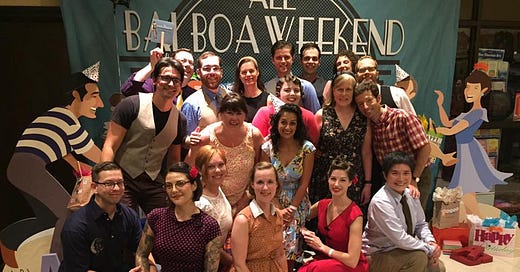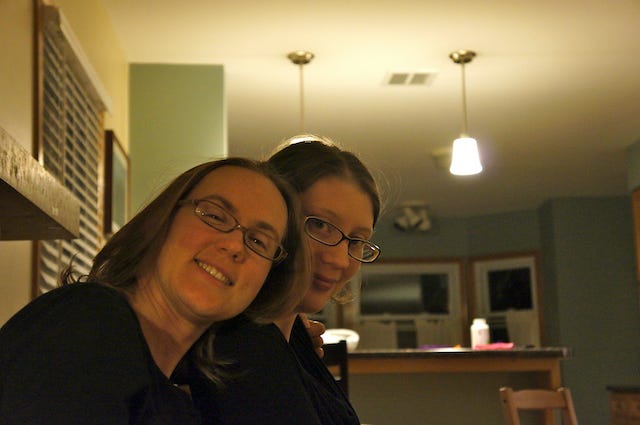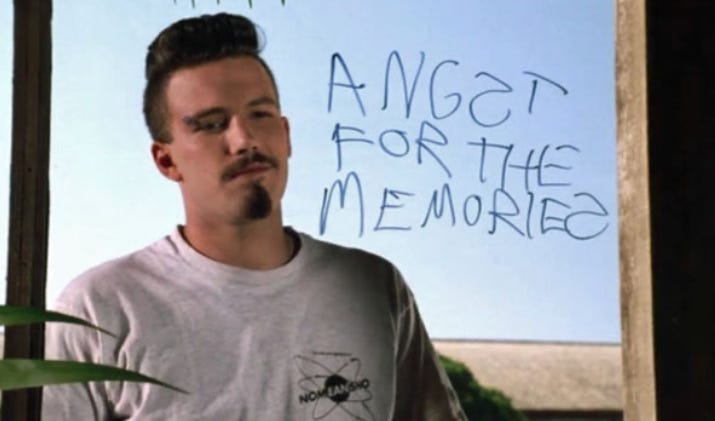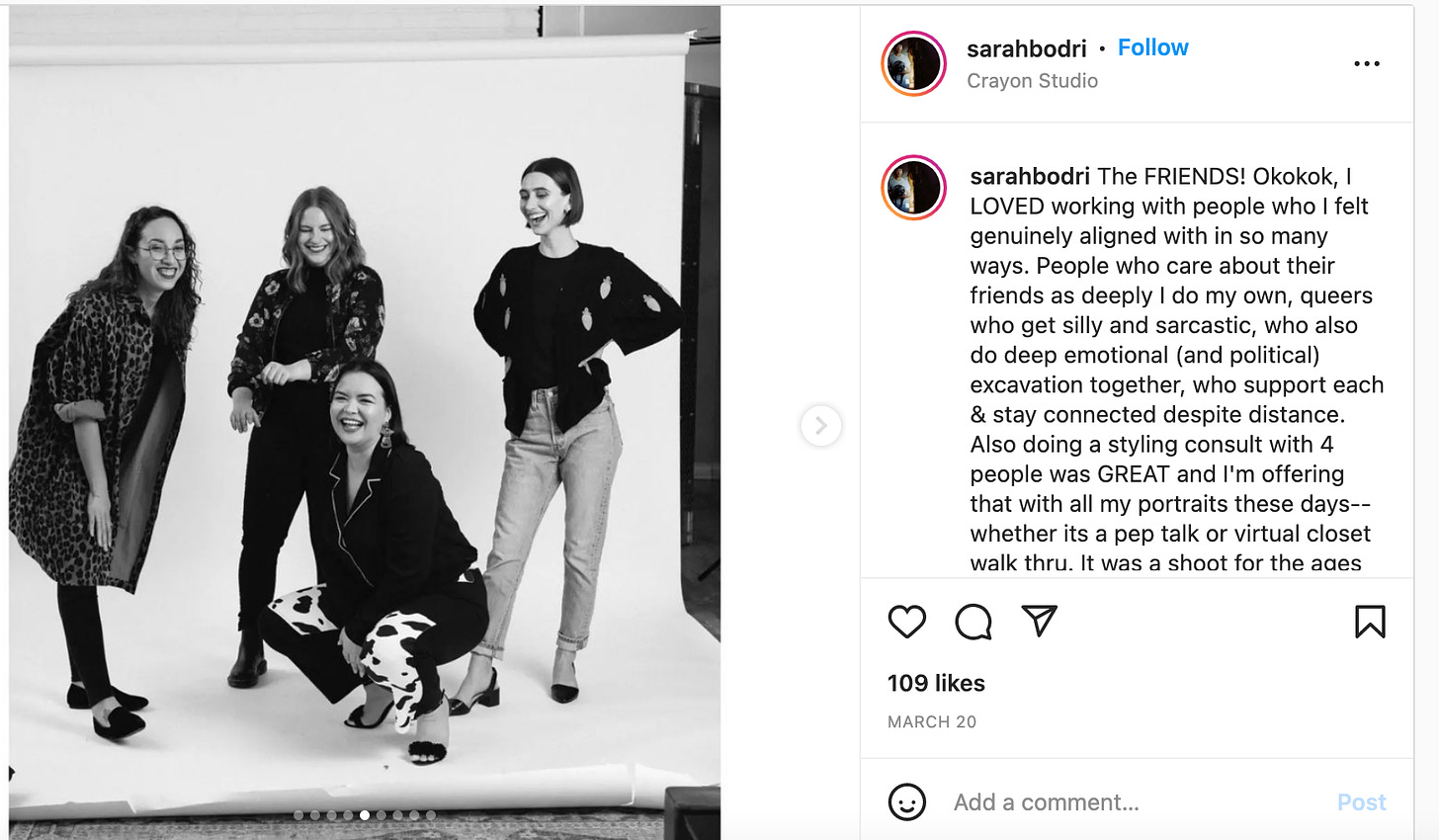I’m excited to see friendship take up more space in the public sphere these days. Thank you to those of you who have sent me articles and posts about friendship – please keep them coming! There are discussions about platonic life partners and what the pandemic has done to our social circles. In February, the Atlantic had a long article titled, ‘It’s your friends who break your heart’ by Jennifer Senior, which sparked conversations around how rare it is for us to talk about friendship breakups.
No matter how good we are about staying friends, a certain amount of churn is inevitable. One of the often-mentioned friendship studies found that we replace about half of the friends in our social network every seven years. Even knowing this and having the lived experience that friends come and go from our lives, the big emotions that come with friend-endings are still not often given space in our cultural conversations.
Swing dance friends from 2016. Fun friends for many years when I had just moved to Toronto.
Slow Fade Friend-Endings
Not all friend-endings are big ruptures to our lives. Reflecting on the changes in my friend circle over the past seven years (think back to your friends in 2015), I realized how many of the neutral-ish friend-endings have to do with a change in other parts of my life, unrelated to the friend.
Friend-endings happen around:
Moving to another city/town/country
Changing jobs (no longer see each other at the office)
Changing life circumstances (one of you has a baby, gets married, etc.)
Romantic breakups and losing contact with their social circle (either your own or a friend’s)
Neither person is putting in the effort, and so you stop getting together
Lack of time for social engagements (because of a job, travel, child, illness, elder care, etc.)
Changing hobbies (you stop being part of a sports team or stop social dancing)
Changing beliefs (i.e., you leave a church)
You meet new friends, and some of your other friendships are left untended
A lot of these have to do with change. Once a relationship is built in a specific context, it can take a lot of effort to stay close through changes. You may not want to stay friends after the change, or you simply drift apart because either one or both are not interested/willing/able to do the work of rebuilding in the new context. (At some point, I’ll write about how I now approach staying friends with my friends who have babies…)
These types of friend-endings are often slow fades. After moving away from Minnesota, I still texted my friends there regularly. (Hi Louise and Gena!) I even found an excuse or two to go back to the Twin Cities to visit them and see their growing children. But as time went by, there was less and less shared context and less general understanding of each other’s lives. Even when a lot of love still exists, unless there is a clear shared interest, it can be hard to know how or when to connect again.
I still have this picture of me and Louise in 2013 on my desk because it reminds me of how much love and care we shared.
I was in more regular contact with my friend Gena longer than others because we shared an interest in nail wraps and could still bond over that. But then I stopped doing my nails during pandemic. I look back and realize it’s been many, many months since I’ve connected with someone who used to be a daily connection.
Ambiguous Loss
Even though these are slow fades rather than huge ruptures, there is still a grieving that comes with the ending. But is it really over? How do I know when/if to grieve a friendship?
The term Ambiguous Loss was coined to describe those situations where we have lost a loved one mentally but not physically, like what happens with Alzheimer’s, or physically but not mentally, like deployment….or breakups. It’s that sense that there is a partial loss, or some aspects of intimacy are lost, and others remain. With romantic breakups and friend-endings, the person is out of our lives but still alive in the world and potentially reachable.
There was a clear moment of sadness and grieving when I moved away from those friends in Minnesota, but then the relationship bumped along with random texts, Christmas cards, and birthday messages. It’s confusing to grieve something that’s still kinda there, right? It can be important just to recognize that these ambiguous feelings exist around past friendships.
With some people, when you stop and notice the loss, you’ll want to get back in touch. But we don’t need to be friends with everyone we’ve ever been friends with in the past.
After reading the Atlantic article and was thinking about old friendships, I impulsively Friended my best friend from Kindergarten on Facebook. (Hi, Angela!) Then I didn’t know what to do next. I didn’t even message her after she accepted the request. I had no game plan or even real reason for connecting. It was just a small flicker of a friend revival. Perhaps I just did it because it’s easier to send the friend request than face the grief of acknowledging how the friendship faded. For some friendships, when you notice the loss or the drifting, maybe it’s okay to grieve and let go. Look at old photos, smile at a happy memory, light a candle as a tribute, and remember them with gratitude.
“Angst for the memories” From Glory Daze (1995), filmed in my hometown.
What are your experiences with slow fade friend-endings? Have you ever successfully revived a friendship after a period of time? How do you grieve after friends drift from your life?
Pro-friendship Tip:
Everyone has their preferred method of communication. Staying friends is sometimes as simple as finding the right method for each unique friendship. It’s difficult to schedule phone calls or hangouts with my friend in California who has young kids, but sending Marco Polo video messages allows each of us to respond exactly when it’s convenient.
Yay Friends Moment of the Week:
These awesome friends had a friend photoshoot!!








I really enjoyed reading this, it gives words to some of my feelings right now. Having moved a lot these last two years (2 states and 3 cities) I can relate to all the feels around "ambiguous loss." I often find myself thinking about my old friends and then sending them random texts. I've also done random Easter/Christmas cards, that way I feel like I'm putting in a little "extra" effort (more so than a text). I really enjoyed reading this- keep them coming!
I really appreciated the quality of your writing. I wanted to add that I recently grieved the loss of a friend. She did not die, but because of a brain tumor, she is no longer able to remember much which is dramatically affected the depth of our relationship.